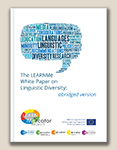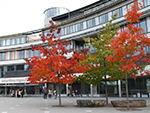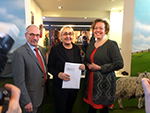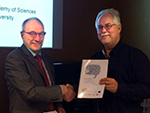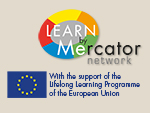Mercator Network Newsletter 119
[CONTENT]
 |
|||||||||||||||||||
| Number 119 - February 2016 | |||||||||||||||||||
| The Mercator newsletter informs you about the news of the five Mercator Network partners: | |||||||||||||||||||
| Mercator Research Centre of the Fryske Akademy | |||||||||||||||||||
| Mercator Media | Mercator Legislation / CUSC-UB | ||||||||||||||||||
| Stockholm University | Research Institute for Linguistics | ||||||||||||||||||
| Newsletter focusing on multilingual regions dealing with regional or minority languages, but also immigrant languages and smaller state languages, with emphasis on language needs arising from migration and globalisation. Submit your subscription request, comments or suggestions to: Johanneke Buning (Fryske Akademy). | |||||||||||||||||||
| Mercator Network presents: the LEARNMe White Paper | |||||||||||||||||||
| Educators of the five Swedish minority languages meet in Södertörn University | |||||||||||||||||||
| Application presented to recognize ’t Bildts as a minority language | |||||||||||||||||||
| Swedish survey results on mother tongue teaching published | |||||||||||||||||||
| Member of European Parliament Nils Torvalds visits Frisia | |||||||||||||||||||
| Google now speaks Corsican, Luxemburgs, Scottish Gaelic, Frisian, and 9 other new languages | |||||||||||||||||||
| Welsh government and Splinter Design release two Welsh language apps | |||||||||||||||||||
| Series of radio broadcasts on small European languages | |||||||||||||||||||
| The last ‘LEARNMe Newsletter‘ | |||||||||||||||||||
Mercator Network presents: the LEARNMe White Paper
By Jorrit Huizinga Februari 29 - The Mercator Network is proud to present the final product of its LEARNMe project: the White Paper on Linguistic Diversity. The original, English-language White Paper (WP) is available in two different versions: a full version and an abridged edition. The abridged WP is an highly accessible document, which contains a clear introduction to the projects‘ background and aims, the challenges surrounding linguistic diversity, and a large number of considerations or recommendations to take into account when dealing with linguistic diversity. The full version provides even more information on the projects’ working process, an in-depth discussion of the terminology surrounding the concept of linguistic diversity, as well as a wide range of positive and negative examples from all over (and outside) Europe. Translators are currently working to translate the abridged edition to the languages of the Mercator Network partners: Dutch, Frisian, Catalan, Spanish, Finnish, Swedish, Welsh, Hungarian and Hungarian Sign Language. This will not only make the contents more accessible to large numbers of Europeans, but also gives a good example for linguistic diversity in academia. You are kindly invited to share the White Paper – or simply its recommendations – throughout your own networks. If you would like to have more information on the document and its contents, do not hesitate to contact us. Download the full version of the LEARNMe White paper. Download the abridged edition of the LEARNMe White paper. |
Educators of the five Swedish minority languages meet in Södertörn University By Jarmo Lainio
February 18 - Representatives of the teacher and higher education institutions of the five national minority languages in Sweden - Finnish, Meänkieli, Romani chib, Sami and Yiddish - met at Södertörn University College. The topics of the day were: continued planning of the emergent or potential structures of mother tongue teacher education of the five languages; discussions on the issue of language vs. dialect, and, the challenges of the languages in society and education. In the audience were among others, almost 30 students of the recent in-service training of Roma teachers and teacher assistants at Södertörn UC, a representative of the National Board of Education, and of minority and mainstream news media. |
||||||||||||||||||
Application presented to recognize ’t Bildts as a minority language
By Rixt van Dongera February 19 - the municipal government of ’t Bildt, located in Frisia, the Netherlands, has handed in its application for the recognition of the language ’t Bildts as a minority language under the European Charter for Regional or Minority Languages of the Council of Europe. Dutch Member of Parliament Lutz Jacobi has received the application on behalf of the Parliamentary Committee of Interior Affairs, of which she is vice-President. Sietske Poepjes, the Frisian Minister of Culture, Education and Language and Nils Torvalds, Member of the European Parliament and one of the Presidents of the Intergroup for Traditional Minorities, have also received a copy of the application, which they can bring under the attention of their respective levels of government. In the application, the municipality of ’t Bildt asks Ronald Plasterk, Dutch Minister of Interior Affairs, to add ’t Bildts to the list of protected languages. The Province of Fryslân supports this application and will try and assist the municipality in its strive for recognition of ’t Bildts. Read more about the language ’t Bildts in the Mercator Research publication: |
|||||||||||||||||||
Swedish survey results on mother tongue teaching published By Jarmo Lainio
February 29 - Several radio channels of the public broadcaster SR will publish their results of a survey sent to all Swedish municipalities (290) regarding issues of mother tongue teaching of the national minority languages. There is a wide variation in the teaching conditions for the different languages, which have a considerable spread in speaker numbers (from about 200,000 for Sweden Finnish to about 1-2,000 for Yiddish). One thing in common for all five languages, however, is that the main pattern and extent to which mother tongues are taught, is 30-60 minutes per week (about 320 hours altogether during the nine years of primary school). This was criticized by the representatives of the teacher education institutions, as being hard to motivate on any pedogogical grounds. It was also clear that not all municipalities that would be expected to provide mother tongue teaching in one or several of the five languages, did so. |
|||||||||||||||||||
Member of European Parliament Nils Torvalds visits Frisia
Nils Torvalds, Member of the European Parliament and one of the Presidents of the Intergroup for Traditional Minorities, has visited the Province of Fryslân from February 19-20. During this visit, he has received a great deal of information on the international aspects of Fryslân. In the morning, Edwin Klinkenberg (Fryske Akademy) and Siart Smit (producer of the Leeuwarden Cultural Capital 2018 project ’Lân fan Taal,’ which translates as ’Land of Languages’) spoke about their respective projects. After which Cor van der Meer and Rixt van Dongera informed Mr Torvalds about the activities of Mercator and handed him the LEARNMe White Paper on Linguistic Diversity. In the afternoon, Mr Torvalds visited a multilingual primary school in ’t Bildt, where a short Bildts language class was organised for him. Afterwards, the municipality of ’t Bildt offered its application for the European Charter for Minority or Regional Languages. On saturday he attended the celebration of the International day of the Mother Language, organised at Slieker Film by the European Office for Small Languages (EBLT). Everyone looks back at a highly successful and instructive visit. |
|||||||||||||||||||
Google now speaks Corsican, Luxemburgs, Scottish Gaelic, Frisian, and 9 other new languages
February 18th - From now on Google is able to translate 13 new languages: Corsican, Luxembourgish, Scottish Gaelic, Frisian, Amharic (Ethiopia), Kirghiz, Samoan, Shona (Zimbabwe), Sindhi (Pakistan), Pashto (Afghanistan and Pakistan) and Xhosa (South Africa). Including those, more than 100 languages are now available in Google's translation machine. According to Google Translate's official blog, "beyond the basic criteria that it must be a written language, we also need a significant amount of translations in the new language to be available on the web." It is thanks to this, the Californian company says, that "machines can "learn" the language " by "identifying statistical patterns at enormous scale […] as we scan the Web for billions of already translated texts." For small languages, collecting enough translations from the web is often not so easy. Luckily, in the past few moths, many volunteers have helped translate over a million sentences from one of these languages into English. Source: Nationalia.info |
|||||||||||||||||||
Welsh government and Splinter Design release two Welsh language apps
Previous month, the Welsh Government together with Splinter Design launched two Welsh second language apps to promote and encourage learners to engage with the Welsh language. The games, designed for teachers and pupils of primary and secondary schools, include curricular related topics and are accompanied by lesson notes. The games are based on Welsh legends. Guto Nyth Brân celebrates the legendary 18th century athlete from the Pontypridd area and Dreigiau Dinas Emrys depicts Gwrtheyrn, the 5th century king of the Celtic Britons, and two mischief-making dragons. |
|||||||||||||||||||
Series of radio broadcasts on small European languages
BBC America is working on a series of broadcasts about Europe's lesser used languages. On february 22, journalist Patric Cox came to Frisia to interview school children at the Frisian Bogerman Koudum school, and several scientists at the Fryske Akademy. Previously, BBC America has focussed on Icelandic and Welsh. Source: omrop fryslan |
|||||||||||||||||||
By Jorrit Huizinga While this is of course not the last issue of the Mercator Newsletter, it is the last to officially double as the newsletter of the LEARNMe project. The official project period comes to an end on February 29. In the last three years, this newsletter has kept you up-to-date on the various LEARNMe events (three workshops and a conference) and publications (three Position Papers based on the workshops, Conference Proceedings). In this last newsletter, we have presented the key publication of the project, the LEARNMe White Paper. Despite the project formally coming to an end network partners will continue to disseminate the White Paper, and updates on this will at times be provided in this newsletter. |
|||||||||||||||||||
|
|
|||||||||||||||||||
The secret anti-languages you're not supposed to know. From London to Timbuktu, there is a teeming underworld of rebellious “anti-societies” who speak a mercurial, ever-changing code. |
|||||||||||||||||||
Wolf species have ’howling dialects’ Largest quantitative study of howling, and first to use machine learning, finds that different groups of wolves use different howling types, resembling dialects. |
|||||||||||||||||||
Fifth edition of the International Master in European Project Planning and Management. The master course is held in Florence and starts 10 October 2016. |
|||||||||||||||||||
Do minority languages need machine translation? Talk by Michal Boleslav Měchura at a British-Irish Council conference (November 2015) busting the myth that language technology is necessary for revival of minority languages. |
|||||||||||||||||||
|
|
|||||||||||||||||||
|
|||||||||||||||||||
With the support of the Lifelong Learning Programme of the European Union.
|
|||||||||||||||||||
| If you would prefer to not receive this newsletter any longer, click unsubscribe | This publication reflects the views only of the author, and the Commission cannot be held responsible for any use which may be made of the information contained therein. | ||||||||||||||||||



